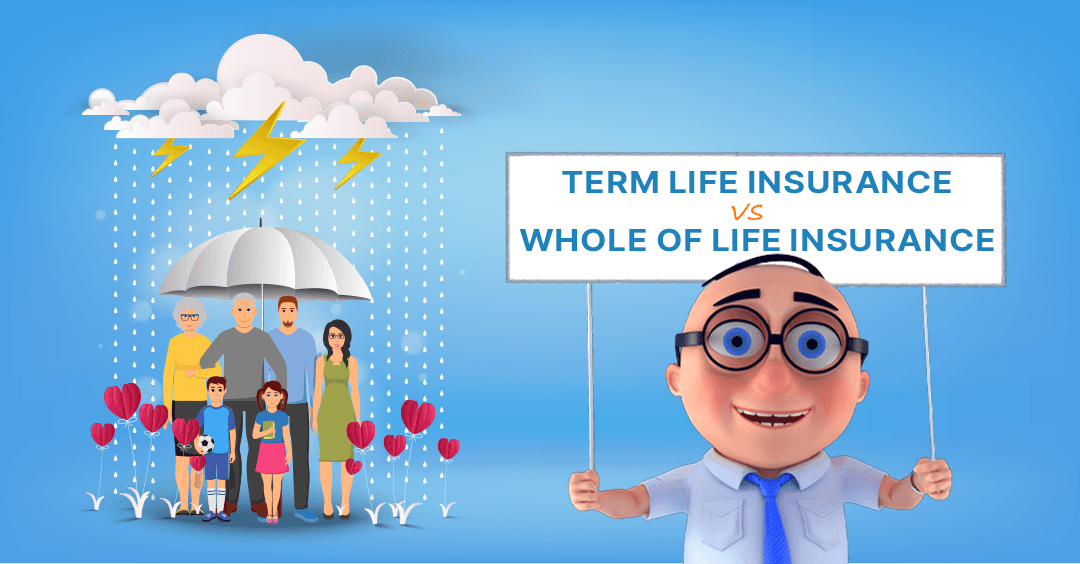So, you’ve heard a lot about life insurance and been persuaded that you should have some. But which product to buy? Term life, whole of life, credit life? You’ve spent so much time reading about insurance you feel you need to get a life! Seriously though, how do you know what is right for you? This blog goes back to basics and tries to shine a light on life insurance.
Life insurance isn’t a legal requirement, so it’s a matter of personal choice whether to have it and which policy to choose to match your circumstances. The cheapest, and most basic type of policy is term life insurance.
What is term life insurance?
Term Life insurance pays out on the policyholder’s death, with the proceeds being paid to named beneficiaries, usually a surviving spouse of dependents. With this type of insurance, you specify a period over which you want the policy to run, which is known as the “term.”
Examples of terms selected and their circumstances include:
- 7 years to cover an auto loan for a new car
- 10 years to cover university fees planning
- 25 years to cover a mortgage or home loan
Are there different types of term life insurance?
There are two main types of term life insurance: these are known as level term and decreasing term. Both work on the basis of selecting a period of cover which the policy will run for (the term). The variable between the two policies is the level of cover provided during the life of the policy.
Let’s look at level term first.
Level Term
With this policy, you select a fixed amount, known as the sum insured, that will pay out on your death. The advantages to this basis of policy are:
- Fixed monthly premium so you know how much you’ll pay regularly
- Fixed sum insured so you know how much your loved ones will receive
The disadvantages with this policy are:
- It can prove more expensive since you are only taking the policy out for a fixed period, so premiums are generally higher than decreasing term equivalent
- As a fixed sum insured, the level of insurance is not inflation-proofed so what you settle on as adequate today may not go as far in the future
Decreasing term life insurance
Decreasing term life insurance is broadly like level term insurance, in that you choose the length of time the policy runs for. The major difference with this type of insurance is that the sum insured, that is the settlement amount, drops throughout the term. This makes it ideal therefore if you are linking it to a financial commitment like a loan, where the capital you need to repay reduces over time. The advantage with this policy is that as the value gets lower, so do the premiums, and with other bills to pay as we get older, this can help. The disadvantage is, of course, that the value drops over time, so could be out of step with health, which can deteriorate as we get older, and wealth, as inflation and other financial commitments might mean the value is insufficient.
What happens when the term ends?
Put simply, your policy expires. Once the period you set for the policy finishes, then so does the cover provided by it. You should take note of the exact expiry date of your policy as in the event of outliving the policy’s term, you’ll need to think about how your dependents are being protected. Some Insurers permit extension of the policy term so it’s something to bear in mind: however, the downside with either an extension or a fresh policy, is that your premiums are likely to be increased because you are now older than when you commenced cover.
So, before you take out either an extension of cover or a new policy, it’s worth giving a second thought to what your needs actually are. Maybe those loans you needed to protect have long been paid off, and now your children are older with possibly jobs and homes of their own, do they still need to benefit from the same level of protection as before, when you were providing for their living and educational fees? A short period term insurance could be taken out with a low sum insured, for example, just to cater for any projected funeral expenses.
Whole Of Life Insurance Policies
Whole of life insurance, as the name implies, is a type of policy that runs throughout your life until your death: the only caveat being that you must keep up with the premium payments for cover to remain in force. These are popular policies because once taken out, and regular instalments set up (direct debit for example), you can forget about them until the time comes to maybe review the adequacy of your sum insured etc.
The big advantage with whole of life insurance is that it’s there when you need it most. As it runs until your death, your loved ones will be reassured that they’re able to claim for invaluable financial support following your passing.
Like term life insurance, there are two main types of whole of life insurance:
- Whole of life pure protection – since this policy runs for the whole of your lifetime, insurers will consider your medical history when processing your application. Those with serious health conditions can expect to pay more, or even face rejection, and all medical conditions must be declared to insurers as part of the application process.
- Whole of life investment linked – again a policy that runs for the whole of your life, but with a subtle difference: with this type of policy, you have a chance to make some additional money over and above the sum insured for death benefit only. There are two types of investment-linked policies. With-profits policies involve the insurance provider investing the money from your premiums with the aim of making enough return to cover the eventual pay-out. With a unit-linked policy, you select the unit-linked investment funds you want to buy with your premiums based on your “risk appetite.” It should be noted that the value of these funds are subject to fluctuation, so you can expect to get regular updates on the performance of your policy (usually annually).
So, now you know more about term life and whole of life insurance, you can hopefully make one of the life’s big decisions: which policy will you choose to protect yours?







